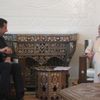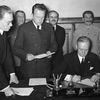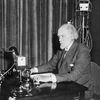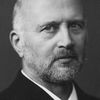27.12.2024 | 08:50
Dubrovnik, oktˇber 2024
Dubrovnik Ý KrˇatÝu er ein fallegasta borg, sem Úg hef komi til. Ůar talai Úg ß rßstefnu evrˇpskra Ýhalds- og umbˇtaflokka um fj÷lskylduna, aldurs■rˇun og frjˇsemi 18. oktˇber 2024. ╔g rifjai upp, a Aristˇteles geri Ý MŠlskulistinni greinarmun ß vihorfum Šskumanna, sem lÚtu stjˇrnast af vonum, og ÷ldunga, sem yljuu sÚr vi minningar. Rosknu fˇlki hefi fj÷lga hlutfallslega me hŠkkandi mealaldri, og ■a kysi frekar Ý kosningum en ungt fˇlk, svo a ■a hefi sÝaukin stjˇrnmßlaßhrif. En ellin ■yrfti sÝur en svo a vera byri ß Šskunni. H˙n gŠti lagt sitt af m÷rkum til aukinnar framleislu og neyslu. KŠnir stjˇrnmßlamenn Šttu a h÷fa jafnt til vona Šskunnar, fj÷lga tŠkifŠrum, og ˇtta ellinnar, verjast ˇ■jˇalř.á
╔g sagi hagfrŠinga hafa bent ß, a fj÷lskyldan hefi l÷ngum veri eins konar gagnkvŠmt tryggingarfÚlag og vettvangur sjßlfvalinnar verkaskiptingar kynjanna, jafnframt ■vÝ sem h˙n vŠri miklu hagkvŠmari neyslueining en einstaklingurinn. Fj÷lskyldan milai lÝka nausynlegri ■ekkingu Ý bßar ßttir. Gˇir foreldrar Šlu b÷rn sÝn upp vi ■Šr reglur og dygir, sem best hefu reynst, svo sem stundvÝsi, vinnusemi, orheldni og hreinlŠti. Ůannig miluu ■eir til ■eirra reynsluviti fyrri kynslˇa, fortÝinni. Fj÷lskyldan bŠtti sÝan framtÝinni vi Ý ˙treikninga og ßkvaranir einstaklinga, ■vÝ a ■eir vildu sem foreldrar skilja eitthva eftir fyrir b÷rn sÝn, b˙a Ý haginn fyrir ■au. Erfaskattur vŠri ranglßtur, ■vÝ a me honum vŠri umbuna fyrir eyslu og refsa fyrir sparna, samtÝin tekin fram yfir framtÝina.
╔g bŠtti ■vÝ vi, a fj÷lskyldan gŠddi lÝf einstaklinganna tilgangi og merkingu. H˙n vÝkkai ˙t sjßlfi. Menn lifu ekki aeins fyrir sjßlfa sig, heldur lÝka fyrir maka og b÷rn.
(Frˇleiksmoli Ý Morgunblainu 26. oktˇber 2024.)
27.12.2024 | 08:47
ReykjavÝk, oktˇber 2024
┴ fundi Ý Ůjˇminjasafninu Ý ReykjavÝk 14. oktˇber 2024 hafi ═sraelsmaurinn Ely Lassman, 27 ßra hagfrŠingur, frams÷gu um „═srael, ArabarÝkin og Vesturveldin“. Margt var ■ar umhugsunarefni. Eitt var, a vi, sem stˇum a fundinum, urum a hafa hann lokaan til a geta rŠtt ■etta mßl Ý nŠi, en ˇspektarfˇlk hefur mj÷g lßti hÚr a sÚr kvea og reynt a ÷skra niurár÷dd ═sraels. Ůetta er ˇelileg takm÷rkun ß mßlfrelsi okkar og fundafrelsi.
Anna umhugsunarefni var skřring Lassmans ß hatri Hamas og Hesbollah hryjuverkasamtakanna ß ═srael. Hann sagi, a ■a Štti sÚr hugmyndalegar rŠtur. ÍfgaÝslam styddist vi řmsar setningar Ý Kˇraninum, sem fŠlu Ý sÚr stŠkt gyingahatur, og vŠri athyglisvert, a oralag vŠri talsvert mildara Ý erlendum ■řingum en ß frummßlinu, arabÝsku. BŠi ■essi samt÷k vildu ˙trřma gyingum.
Skřring Lassmans ß ■vÝ, a margir Vesturlandab˙ar hafa teki upp mßlsta Hamas og Hesbollah, var lÝka umhugsunarefni: Marxistar og arir ÷fgavinstrimenn vŠru a vÝsu ˇlÝkir ÷fgam˙slimum um margt, en bßir hˇpar Šttu ■a sameiginlegt a hata vestrŠna menningu, einkaeignarrÚtt, viskiptafrelsi, valddreifingu, fj÷lbreytni, umburarlyndi, frjßlsa samkeppni hugmynda, lÝfsglei og lÝfsnautnir. ═srael vŠri eina vestrŠna rÝki Ý Miausturl÷ndum, svo a ekki Štti a koma ß ˇvart, a ÷fgavinstrimenn vildu ■a feigt.
(Frˇleiksmoli Ý Morgunblainu 19. oktˇber 2024.)
27.12.2024 | 08:45
Blˇbai 1947
═ Indlandsf÷r Ý september 2024 komst Úg a ■vÝ, hversu lÝti Úg vissi um fj÷lmennasta rÝki heims og vŠnlegan bandamann Vesturveldanna gegn ÷xulveldunum ßgengu (KÝna, R˙sslandi, ═ran og Norur-Kˇreu). Breska rÝki tˇk stjˇrn Indlands ˙r h÷ndum Austur-IndÝa fÚlagsins ßri 1858, en hreyfi ekki vi hinum m÷rgu furstadŠmum, ■ar sem um ■rijungur Indverja bjˇ. ┴rin milli strÝa var stefnt a heimastjˇrn. Bretar og raunsŠir Indverjar unnu a ■vÝ, a Indland yri rÝkjasamband me sameiginlegar varnir, utanrÝkisstefnu og gjaldmiil, en hver eining me fˇtfestu Ý s÷gunni stjˇrnai sÚr a ÷ru leyti sjßlf eftir eigin hefum og venjum. Var ■a elilegt, ■vÝ a Indverjar skiptust Ý ˇtal hˇpa eftir mßlum, uppruna og tr˙arbr÷gum. ═ norurhlutanum var skiptingin skřrust milli hind˙a, sem t÷luu hindi, og m˙slima, sem t÷luu urdu, en ■ˇtt mßlin sÚu nßskyld, eru ■au skrifu me ˇlÝku letri.
Ekkert var ■ˇ ˙r hugmyndum um valddreifingu Ý lauslegu rÝkjasambandi lřvelda og furstadŠma, ■ar sem samkeppni um ■egna hefi haldi aftur af valdh÷fum. Indverski ■jˇarrßsflokkurinn (Congress), sem var aallega skipaur vinstri sinnuum menntam÷nnum, heimtai eitt mistřrt rÝki. M˙slimar gßtu hins vegar ekki hugsa sÚr a lenda undir stjˇrn hind˙a. ═ Bretlandi komst ßri 1945 til valda vinstri stjˇrn, sem hafi sam˙ me mistřringarm÷nnum. H˙n ßkva a leyfa forystum÷nnum hind˙a og m˙slima a skipta landinu, og Bretar hr÷uu sÚr ß braut ßri 1947. Afleiingin var eitt mesta blˇba n˙tÝmans, sem sÝasti breski landstjˇrinn, Mountbatten lßvarur, bar verulega ßbyrg ß me ˇagoti sÝnu. LÝklega hafa samkvŠmt nřjustu rannsˇknum um tvŠr milljˇnir třnt lÝfi Ý vÝgaferlum hind˙a og m˙slima, en ßtjßn milljˇnir fl˙i ß vÝxl milli Indlands og hins nřja m˙slimarÝkis Pakistans. Ůessi hrŠilegi harmleikur hefi aldrei ■urft a eiga sÚr sta.
(Frˇleiksmoli Ý Morgunblainu 12. oktˇber 2024.)
27.12.2024 | 08:43
Markair og frumkv÷lar
Er auur Vesturlanda sˇttur Ý arrßn ß nřlendum og afrakstur af ■rŠlahaldi? Spillir kapÝtalisminn umhverfinu og sˇar aulindum? Er kapÝtalisminn andlaust kapphlaup um efnisleg gŠi, ■ar sem menn třna sßlu sinni? Ůessum spurningum svara nokkrir rŠumenn ß rßstefnu evrˇpskra frjßlshyggjust˙denta, Students for Liberty Europe, RSE, Rannsˇknarmist÷var Ý samfÚlags- og efnahagsmßlum, og fleiri aila Ý ReykjavÝk laugardaginn 12. oktˇber kl. 14–18. Ber rßstefnan yfirskriftina _Markair og frumkv÷lar“.
ŮrŠlahald og nřlendustefna
Einn rŠumaurinn er dr. Kristian Niemietz, aalhagfrŠingur hinnar ßhrifamiklu stofnunar Institute of Economic Affairs Ý Lund˙num. Hann gaf fyrr ß ■essu ßri ˙t frˇlega bˇk, Imperial Measurement: A cost-benefit analysis of Western colonialism, MŠlingar ß nřlenduveldum: kostnaar- og nytjagreining ß vestrŠnni nřlendustefnu. Tilefni var, a Ý afturk÷llunarfßri (cancel culture) sÝustu ßra er ■vÝ iulega haldi fram, a auur Vesturlanda sÚ sˇttur Ý arrßn ß nřlendum og afrakstur af ■rŠlahaldi. Niemietz minnir hins vegar ß, a Adam Smith taldi nřlendur leia af sÚr meira tap en grˇa. En ef Smith hafi rÚtt fyrir sÚr, hvernig stˇ ■ß ß nřlendukapphlaupinu ß nÝtjßndu ÷ld? Skřringin er, a tapi dreifist ß alla, en grˇann hirti tilt÷lulega fßmennur hˇpur valdamanna. Jafnframt var ■a metnaarmßl stŠrstu rÝkjanna Ý Evrˇpu a eignast nřlendur.
Niemietz bendir ß, a Ý Bretaveldi var utanrÝkisverslun aeins lÝtill hluti heildarverslunar og aallega vi arar vestrŠnar ■jˇir, ekki vi nřlendurnar, auk ■ess sem ■orri fjßrfestinga var fjßrmagnaur me innlendum sparnai og ari af verslun vi arar vestrŠnar ■jˇir. Ůa kostai Breta lÝka stˇrfÚ a halda ˙ti sÝnum volduga flota. Svipa var a segja um ÷nnur nřlenduveldi. Ůegar millifŠrslur frß Frakklandi til nřlendna ■ess og frß nřlendunum til Frakklands voru virtar saman, nßmu ˙tgj÷ld umfram tekjur um 0,3 af hundrai rÝkis˙tgjalda. Ůřska rÝki hÚlt nßkvŠmt bˇkhald um ˙tgj÷ld og tekjur af nřlendunum, og reyndist vera verulegt tap af ■eim, en verslun vi ■Šr var hverfandi hluti af heildarverslun Ůřskalands. Eina skřra dŠmi um, a grˇi af nřlendu hafi lÝklega veri meiri en tap, er lÝklega belgÝska Kongˇ, en stjˇrn ■ess verur seint talin til fyrirmyndar. Ůar var um arrßn a rŠa. Ůetta er undantekningin, sem sannar regluna.
Niemietz vekur athygli ß, a nokkur auugustu rÝki Evrˇpu ßttu aldrei nřlendur, svo sem Noregur og Sviss. Hann hafnar ■vÝ einnig, a ■rŠlahald hafi borga sig. LÝklega voru einu jßkvŠu ßhrifin af ■vÝ a ■urfa ekki a greia vinnulaun ß plantekrum Ý KarÝbahafi, a ver ß sykri, tˇbaki, kryddv÷ru, bˇmull og kaffi var lŠgra en ella. Verslun me ■rŠla var ekki heldur mikilvŠgur ■ßttur Ý heildarverslun Breta og annarra ■jˇa. Niemietz gerir Ý bˇk sinni aeins kostnaar- og nytjagreiningu ß ■rŠlahaldi, svo a hann minnist ekki ß ■Šr ■rjßr umhugsunarveru stareyndir um ■a, a Arabar hˇfu ■a fyrr og hŠttu ■vÝ sÝar en vestrŠnar ■jˇir, a Bretar beittu flota sÝnum hart ß ÷ndverri nÝtjßndu ÷ld til a st÷va ■rŠlaflutninga yfir Atlantshaf og a ■a voru aallega afrÝskir hÚrash÷fingjar, sem eltu uppi ara AfrÝkumenn og seldu Ý ■rŠldˇm. Arir Šttu ■vÝ a vera me meira samviskubit s÷kum ■rŠlahalds en venjulegir Vesturlandab˙ar.
Umhverfisvernd Ý krafti atvinnufrelsis
Annar rŠumaur er Ragnar ┴rnason, prˇfessor emeritus Ý Hßskˇla ═slands, en hann nřtural■jˇlegrar viurkenningar sem sÚrfrŠingur um aulindanřtingu. Er Ý nŠsta mßnui vŠntanlegt greinasafn eftir hann, Fish, Wealth, and Welfare, Fiskur, fÚ og farsŠld, sem Almenna bˇkafÚlagi gefur ˙t. Ragnar Štlar a segja frß tilt÷lulega nřjum skˇla innan hagfrŠinnar, _free market environmentalism,“ umhverfisvernd Ý krafti atvinnufrelsis. Frumforsenda ■essa skˇla er, a vernd krefjist verndara. Ef vi viljum vernda gŠi nßtt˙runnar, ■ß verum vi a finna ■eim verndara. Hver er til dŠmis skřringin ß ■vÝ, a fÝlar og nashyrningar Ý AfrÝku eru Ý ˙trřmingarhŠttu, en ekki saufÚ ß ═slandi? H˙n er, a saufÚ er Ý einkaeign, merkt og girt af. Eigendur ■ess gŠta ■ess. Aristˇteles benti einmitt ß ■a forum Ý gagnrřni sinni ß sameignarboskap Platˇns, a ■a, sem allir eiga, hirir enginn um. EinkaeignarrÚttur stular a hagkvŠmri nřtingu aulinda og raunar lÝka mannlegra hŠfileika. Fßi menn ekki a uppskera sjßlfir, ■ß hŠtta ■eir a sß. Ůessi hugsun birtist Ý ■eirri Ýslensku al■řuspeki, a sjaldan grˇi gras ß almenningsg÷tu.
Tilt÷lulega einfalt er a mynda einkaeignarrÚtt ß landi og kvikfÚnai. Land er girt af og kvikfÚ merkt eigendum. En mßli vandast, ■egar margir nřta saman gŠi. Eitt dŠmi um ■a voru afrÚttirnar Ýslensku, sem saufÚ var beitt ß a sumarlagi, en ekki borgai sig a mynda ß ■eim einkaeignarrÚtt. BŠndur Ý hverjum hrepp nřttu saman hverja afrÚtt. En ■ß var til freistnivandi ea ■a, sem kalla hefur veri _samnřtingarb÷li“ (tragedy of the commons). Hver bˇndi freistaist til a reka of margt fÚ ß fjall ß vorin, ■vÝ a hann naut einn grˇans, en allir bßru Ý sameiningu tapi. Ůetta leystu fornmenn me hinni svok÷lluu Ýt÷lu. Hver bˇndi mßtti aeins _telja Ý“ afrÚttina tiltekinn fj÷lda saufjßr. Og heildartala fjßr Ý hverri afrÚtt var miu vi ■a, a fÚ kŠmi sem feitast af fjalli ß haustin, eins og segir Ý Grßgßs.
HlistŠtt dŠmi eru Ýslensku fiskimiin. ┴ mean agangur var ˇtakmarkaur a ■essum takm÷rkuu gŠum, freistaist hver ˙tgerarmaur til a auka sˇknina, ■vÝ a hann hirti ßvinninginn af aukningunni, en allir bßru Ý sameiningu tapi, sem fˇlst Ý sÝfellt stŠrri fiskiskipaflota a eltast vi sÝfellt minnkandi fiskistofna. ═ rauninni var sama lausn fyrir valinu ß ═slandi og um grasnytjar a fornu, nema hva Ý sta Ýt÷lu, sem fylgdi j÷rum, kom kvˇti, sem fylgdi skipum. Hver ˙tgerarmaur mßtti aeins veia tilteki hlutfall af leyfilegum heildarafla. Hann (ea h˙n) fÚkk aflaheimildir, kvˇta, sem gekk kaupum og s÷lum, svo a ■eir, sem veiddu me lŠgstum tilkostnai og ■vÝ mestum ari, gßtu keypt ˙t ■ß, sem sÝur voru fallnir til veia. Ůetta kerfi myndaist fyrst Ý veium ß uppsjßvarfiski ß ßttunda ßratug, en var sÝan teki upp Ý veium ß botnfiski og var heildstŠtt ßri 1990. Er ˇhŠtt a segja, a vel hafi tekist til. ËlÝkt ÷rum ■jˇum stunda ═slendingar sjßlfbŠrar og arbŠrar fiskveiar.
Vi upphaflega ˙thlutun aflaheimilda ea kvˇta var fylgt svokallari afareglu (grandfathering), ■ar sem mia var vi aflareynslu. Ef ˙tgerarmaur hafi veitt fimm af hundrai heildarafla Ý fiskistofni ßrin ßur en kvˇti var settur ß, ■ß fÚkk hann (ea h˙n) fimm af hundrai aflaheimildanna Ý ■eim fiskistofni. Ůannig var lßgmarksr÷skun ß hag ˙tgerarmanna, eftir a ˇhjßkvŠmilegt var a takmarka agang a fiskimiunum.
Frumkv÷lar Ý ÷ndvegi
Ůriji rŠumaurinn er Ely Lassman, sem er aeins 27 ßra a aldri. Hann brautskrßist fyrir einu ßri Ý hagfrŠi frß Bristol-hßskˇla ß Englandi. Hann er formaur Prometheus on Campus, en ■au samt÷k leitast vi a kynna boskap skßldkonunnar Ayns Rands Ý hßskˇlum. Hafa bŠkur hennar selst Ý ■rjßtÝu milljˇnum eintaka og skÝrskota ekki sÝst til ungs fˇlks. Almenna bˇkafÚlagi hefur gefi ˙t ■rjßr skßlds÷gur Rands, KÝru Arg˙novu, Uppsprettunaog Undirst÷una. Var KÝra Arg˙nova raunar framhaldssaga Ý Morgunblainu ßri 1949. Rand flři frß R˙sslandi um mijan ■rija ßratug sÝustu aldar, settist a Ý BandarÝkjunum og haslai sÚr ■ar v÷ll. H˙n ahylltist eindregna einstaklingshyggju og taldi skřjaklj˙finn eitt af merkilegustu afrekum mannsandans.
Ayn Rand setti fram tvŠr frumlegar hugmyndir Ý skßlds÷gum sÝnum. Hin fyrri var, a kapÝtalisminn vŠri ekki andlaust kapphlaup um efnisleg gŠi. Hetjur kapÝtalismans ea viskiptaskipulagsins vŠru hins vegar ekki herforingjar ß hvÝtum fßkum ea mŠlskugarpar ß torgum ˙ti, heldur frumkv÷lar, inj÷frar, brautryjendur, athafnamenn. Ůeir lifa ekki snÝkjulÝfi ß nßungum sÝnum, heldur skapa eitthva nřtt, og arir njˇta ■ess me ■eim Ý frjßlsum viskiptum. ┴ mean rith÷fundarnir Halldˇr Gujˇnsson frß Laxnesi og ١rbergur ١rarson sßtu ß kaffih˙sum vi AalstrŠti og skr÷fuu um, hvernig bŠta mŠtti kj÷r Ýslenskrar al■řu, sat Jˇn Ůorlßksson verkfrŠingur ß skrifstofu sinni Ý BankastrŠti og lagi ß rßin um vegi og brřr, svo a fˇlk gŠti komist leiar sinnar fyrirhafnarlÝti, teiknai vatnsveitur, svo a ■a Štti agang a hreinu vatni, rafmagnsveitur, svo a ■a gŠti kveikt ljˇs Ý vetrarmyrkrinu, og hitaveitur, svo a ■a gŠti bŠgt frß sÚr vetrarkuldanum.
Seinni hugmyndin er Ý beinu framhaldi af hinni fyrri. H˙n er s˙ spurning, hva gerist, ef dugmesta fˇlki gefst upp ß a vinna fyrir ara og finnur sÚr samasta, ■ar sem ■a getur noti eigin verka. Svari er auvita, a ■ß hleypur ˇßran Ý ■ß, sem eftir sitja. SÝfellt harari ßt÷k vera um sÝfellt minni feng. Íll orkan fer Ý a skipta, engin Ý a skapa. Rand lřsir ■essu eftirminnilega Ý Undirst÷unni, en m÷rg dŠmi eru til um ■etta Ý mannkynss÷gunni. Ůau FerdÝnand og ═sabella rßku gyinga frß Spßni Ý lok fimmtßndu aldar, en ■eir h÷fu stai framarlega Ý vÝsindum, listum og atvinnulÝfi. Afleiingin var st÷nun. ┴ K˙bu flři allt dugmesta fˇlki eftir valdat÷ku komm˙nista, tÝu af hundrai landsmanna, og afleiingin var almenn fßtŠkt. Ef til vill er SvÝ■jˇ besta dŠmi. Um mija nÝtjßndu ÷ld nßu eindregnir frjßlshyggjumenn ■ar v÷ldum og juku stˇrlega atvinnufrelsi. Fj÷ldi frumkv÷la spratt upp. NŠstu hundra ßrin var hagv÷xtur Ý SvÝ■jˇ ÷r, og ■jˇin var ein hin rÝkasta Ý heimi. En upp ˙r 1970 nßu rˇttŠklingar v÷ldum Ý sŠnska jafnaarmannaflokknum, sem ßur hafi veri tilt÷lulega hˇfsamur, skattbyri ■yngdist stˇrlega, v÷xtur einkageirans st÷vaist, og athafnamenn hr÷kkluust ˙r landi, ekki sÝst til Sviss. En upp ˙r 1990 sßu SvÝar a sÚr og hafa veri a feta varlega aftur brautina Ý ßtt til ÷flugra einkaframtaks.
Raddir ungs fˇlks
Fjˇrir arir rŠumenn eru ß rßstefnunni. Tahmineh Dehbozorgi er 26 ßra laganemi, fŠdd Ý ═ran, en flři ßsamt foreldrum sÝnum til BandarÝkjanna ßri 2015 og hefur sÝan veri virk Ý řmsum frelsissamt÷kum. H˙n Štlar a minna fundarmenn ß gildi frelsisins. Ida Johansson er 22 ßra sŠnskur frumkv÷ull, sem hŠtti Ý skˇla 18 ßra og stofnai fyrirtŠki, sem h˙n seldi nřlega. H˙n Štlar a rŠa um kynslˇir og kaupmßtt. Lovro og Marin Lesic eru tvÝtugir Krˇatar, stunda nßm Ý fjßrmßlafrŠi Ý Zagreb, hafa stofna fjßrfestinga- og nřsk÷punarfÚlag og fengi verlaun fyrir řmsar hugmyndir sÝnar. Ătla ■eir a segja frß reynslu sinni og vonum. Verur frˇlegt a hlusta ß raddir ■essa unga fˇlks. Anton Sveinn McKee, sem hefur fjˇrum sinnum keppt fyrir ═sland ß OlympÝuleikum, stjˇrnar rßstefnunni, en henni er skipt Ý ■rjßr stuttar lotur, og stjˇrna ■eim Diljß Mist Einarsdˇttir al■ingismaur, Frosti Logason hlavarpsstjˇri og Haukur Ingi Jˇnsson, nemi Ý fjßrmßlaverkfrŠi Ý Hßskˇlanum Ý ReykjavÝk. ┴slaug Arna Sigurbj÷rnsdˇttir nřsk÷punarrßherra setur rßstefnuna, en dr. Birgir ١r Runˇlfsson, forseti hagfrŠideildar Hßskˇla ═slands, mŠlir nokkur lokaor.
(Grein Ý Morgunblainu 11. oktˇber 2024.)
27.12.2024 | 08:40
Agra, september 2024
═ Indlandsfer Ý september 2024 skrapp Úg til Agra, sem er um 230 km Ý suaustur frß Nřju DelÝ. H˙n var um skei h÷fuborg M˙gal-keisaradŠmisins, sem nßi til mestalls Indlandsskaga. Ůar skoai Úg Taj Mahal, sem keisarinn Shah Jahan (1592–1666) reisti til minningar um eiginkonu sÝna. Ůetta grafhřsi er me rÚttu tali eitt af fegurstu mannvirkjum heims, gert ˙r hvÝtum marmara og allt a ■vÝ ˇjarneskt, ■okkafullt, svÝfur frekar en stendur. Enn fremur lagi Úg lei mÝna ÝáAgra-virki, sem var feikistˇr keisarah÷ll, en sonur Shah Jahan hneppti hann Ý stofufangelsi ■ar, ■ˇtt s˙ bˇt vŠri Ý mßli, a hann gat horft ß grafhřsi eiginkonunnar ˙r Ýb˙ sinni.
═ Agra-virki var mÚr ljˇst, hvÝlÝkt stˇrveldi Indland var um 1700. Ůß bjˇ ■ar um fimmtungur jararb˙a, og landsframleislan nam um fjˇrungi heimsframleislunnar. Ůegar Indland var sjßlfstŠtt rÝki ßri 1947, nam landsframleislan hins vegar aeins fjˇrum af hundrai heimsframleislunnar, en Indverjar voru ■ˇ enn um fimmtungur jararb˙a. Hva gerist? Hvers vegna drˇst Indland aftur ˙r? Marxistar svara ■vÝ til, a Bretar hafi arrŠnt Indland eins og borgarastÚtt hvers lands hafi arrŠnt ÷reiga. Sß galli er ß ■eirri kenningu, a st÷nun atvinnulÝfsins hafi hafist ■egar snemma ß ßtjßndu ÷ld, ßur en Bretar komu til s÷gu. M˙gal-keisaradŠmi hafi veikst stˇrlega og misst yfirrß yfir m÷rgum svŠum Indlandsskaga og innrßsarherir lßti greipar sˇpa. Togstreita hind˙a og m˙slima olli lÝka b˙sifjum. Minnir s˙ saga talsvert ß ■rjßtÝu ßra strÝi Ý Ůřskalandi 1618–1648, sem tafi framfarir ■ar um hßtt Ý tvŠr aldir.
SÝan nßi Austur-IndÝafÚlagi yfirrßum yfir vÝßttumiklum svŠum Indlandsskaga, en Adam Smith benti rÚttilega ß Ý Auleg ■jˇanna, a ■a vŠri illa falli til a fara me v÷ld. Ůegar Bretar tˇku loks stjˇrn Indlands Ý sÝnar hendur ßri 1858, var erfitt a sn˙a vi blainu, auk ■ess sem nřlenduherrarnir voru stundum tˇmlßtir um ■etta mikla land.
(Frˇleiksmoli Ý Morgunblainu 5. oktˇber 2024.)
27.12.2024 | 08:38
Nřja DelÝ, september 2024
Ůa var einkennileg tilfinning a koma frß einu fßmennasta landi jarar til Indlands, sem n˙ er fj÷lmennasta rÝki heims me nŠr 1,5 milljar Ýb˙a. Ůar sat Úg 22.–26. september Ý Nřju DelÝ rßstefnu Mont Pelerin samtakanna, sem Friedrich von Hayek stofnai ßri 1947 sem al■jˇlegt mßlfundafÚlag frjßlslyndra frŠimanna.
Indland hlaut sjßlfstŠi sama ßr og samt÷kin voru stofnu. NŠstu 42 ßrin rÚ ■ar ein fj÷lskylda mestu, Jawaharlal Nehru, forsŠtisrßherra 1947–1964, dˇttir hans, Indira Gandhi, forsŠtisrßherra 1966–1977 og 1980–1984, og sonur hennar, Rajiv Gandhi, forsŠtisrßherra 1984–1989. Ůessi valdafj÷lskylda hafi hloti menntun hjß breskum sˇsÝalistum og reyndi a koma ß sˇsÝalisma ß Indlandi. Afleiingin var st÷nun og fßtŠkt. Haft var ß ori, a „the British Raj“ hefi breyst Ý „the Licence Raj“, breskt vald Ý leyfisveitingavald. En ßri 1991 gerbreyttu Indverjar um stefnu, opnuu hagkerfi og stˇrjuku atvinnufrelsi. ┴rangurinn var Švintřralegur. Hagv÷xtur ß mann hafi veri innan vi 2% a mealtali fyrstu ■rjß ßratugina eftir sjßlfstŠi, en margfaldaist n˙, var til dŠmis 9% ßri 2021 og 7% ßri 2022. FßtŠkt snarminnkai, ■ˇtt enn sÚ h˙n tilfinnanleg.
┴ rßstefnunni Ý Nřju DelÝ bar einn fyrirlesarinn saman frammist÷u nokkurra rÝkja, Filippseyja og Suur-Kˇreu, Botsvana og SambÝu og DˇmÝnikanska lřveldisins og NÝkarag˙a, og var samanbururinn undantekningarlaust atvinnufrelsinu Ý vil. ┴ mean Úg hlustai ß rŠu hans, velti Úg ■vÝ fyrir mÚr, hvort Bretar hefu ekki gert mist÷k me ■vÝ a veita ekki einst÷kum rÝkjum Indlands, til dŠmis furstadŠmunum Hyderabad og Mysore, sjßlfstŠi ßri 1947 Ý sta ■ess a afhenda hrokafullu hßskˇlafˇlki ÷ll yfirrß Ý einu risarÝki. Ůß hefi ef til vill ori til samkeppni einstakra indverskra rÝkja um skynsamlega hagstjˇrn. Hafi einhver vi ■etta a athuga, a ˙relt sÚ a fela furstafj÷lskyldum v÷ld, ■ß mß benda ß, a ein fj÷lskylda stjˇrnai einmitt Indlandi Ý r÷ska fjˇra ßratugi, ■ˇtt h˙n kenndi sig vi al■řuna.
(Frˇleiksmoli Ý Morgunblainu 28. september 2024.)
Stjˇrnmßl og samfÚlag | Breytt s.d. kl. 08:39 | Slˇ | Facebook
27.12.2024 | 08:36
Dyflinn, september 2024
SamkvŠmt ═slendingabˇk er Úg 28. maur frß Melkorku Mřrkjartansdˇttur hinni Ýrsku og 31. maur frß Aui dj˙p˙gu Ketilsdˇttur, sem gift var norrŠnum herkonungi Ý Dyflinni ß ═rlandi, en hraktist til ═slands seint ß nÝundu ÷ld, eftir a maur hennar og sonur h÷fu veri felldir. Ůa var ■vÝ frˇlegt a koma til Dyflinnar, ■ar sem Úg hÚlt fyrirlestur ß mßlstofu 17. september 2024 ßsamt ═slandsvininum Daniel Hannan, barˇn af Kingsclere.
═ fyrirlestri mÝnum rakti Úg hina fornu germ÷nsku sjßlfstjˇrnarhef, sem Tacitus lřsti fyrir tv÷ ■˙sund ßrum og Montesquieu taldi upphaf ■rÝskiptingar rÝkisvalds. Snorri Sturluson ßtti rŠtur Ý ■essari hef. Hann hafi sam˙ me tveimur forngerm÷nskum hugmyndum, a valdhafar yru a l˙ta s÷mu l÷gum og ■egnar ■eirra og a svipta mŠtti ■ß v÷ldum, brytu ■eir l÷gin freklega. Seinna ßtti John Locke eftir a binda ■essar hugmyndir Ý heimspekikerfi. Frjßlshyggja hans og ■eirra Davids Humes og Adams Smiths var Ý rauninni ˙tlegging ß ■eirri stjˇrnmßlahef, sem myndast hafi ß Stˇra Bretlandi, ekki sÝst me byltingunni blˇlausu 1688, en h˙n var ger til a treysta og fŠra ˙t hefbundin rÚttindi.
Franska byltingin 1789 var hins vegar tilraun til a umskapa allt ■jˇlÝfi eftir kenningum rith÷funda, sem enga reynslu h÷fu af mannaforrßum. H˙n hlaut a enda illa. Ůetta sß Edmund Burke, og Ý mef÷rum hans var frjßlshyggja ■eirra Lockes, Humes og Smiths a frjßlslyndri Ýhaldstefnu, sem ■eir Alexis de Tocqueville og Friedrich von Hayek efldu sÝar a r÷kum. Fyrir ■eim voru aalatriin valddreifing, viskiptafrelsi og einkaeignarrÚttur. Hin kvÝsl frjßlshyggjunnar var frjßlslyndisstefna ■eirra Tˇmasar Paines, Johns Stuarts Mills, Johns Maynards Keynes og Bertils Ohlins, en h˙n einkennist af vÝsřni, rˇmantÝskri einstaklinghyggju og ÷rlŠti ß almannafÚ.
(Frˇleiksmoli Ý Morgunblainu 21. september 2024.)
27.12.2024 | 08:33
HŠfi Rˇberts Spanˇ
Ů÷gnin getur veri merkileg heimild. Vori 2009 geri SigrÝur Benediktsdˇttir Ý Rannsˇknarnefnd Al■ingis ß bankahruninu sig vanhŠfa me gßleysislegum ummŠlum Ý bandarÝsku st˙dentablai. Arir nefndarmenn bßu hana a vÝkja, en h˙n neitai. Ůeir gßfust upp og breyttu niurst÷u sinni me frßleitum r÷kum. Rˇbert Spanˇ ■agi.
Nokkru eftir a naumur meiri hluti Al■ingis ßkva hausti 2010 a h÷fa mßl gegn Geir H. Haarde fyrir Landsdˇmi, settist EirÝkur Tˇmasson Ý dˇminn. Hann hafi ekki aeins veri stjˇrnmßlaandstŠingur Geirs, heldur lÝka haldi ■vÝ fram opinberlega, a neyarl÷gin 2008, sem Geir bar fram, ávŠru hreinn stuldur frß reikningseigendum Ý peningamßlasjˇum, en ■ar geymdi hann fÚ samtaka, sem hann stjˇrnai. Spanˇ ■agi.
EirÝkur hafi einnig skrifa grein ß visir.is ■ar sem hann kenndi rÝkisstjˇrn Geirs H. Haarde beinlÝnis um bankahruni, en s˙ grein hvarf skyndilega eftir stuttan tÝma. Spanˇ ■agi. Hann veitti hins vegar ■ingm÷nnum vinstri flokka asto vi undirb˙ning mßlsins gegn Geir.
N˙ ryst Spanˇ skyndilega fram og telur auheyrilega hafaáveri rÚtt a ßminna vararÝkissaksˇknara fyrir řmis ˇvarleg ummŠli opinberlega og sÝan leysa hann tÝmabundi frß st÷rfum. Sjßlfur tel Úg hafa veri rÚtt a vanda um vi vararÝkissaksˇknara fyrir ummŠlin og leggja fyrir hann a fara embŠttis sÝns vegna gŠtilega, en lßta ■ar vi sitja.
Ůa breytir ■vÝ ekki, a ˇ■jˇalřur reynir n˙ a ■agga niur Ý m÷nnum. Stendur hann a kŠrunni ß hendur vararÝkissaksˇknara. Einn ˙r hˇpnum rÚst ß utanrÝkisrßherra ß fundi Ý Hßskˇlanum, annar reyndi a st÷kkva af ßheyrendap÷llum Al■ingis niur Ý fundarsalinn, og ■essi lřur hefur hva eftir anna trufla starfsfri ■ingsins. Leitogi hans er hin hßlftyrkneska Sema Serderoglu, en ■egar Spanˇ starfai Ý Strassborg, spˇkai hann sig me hinumáillrŠmda Erdogan Tyrklandsforseta.
(Frˇleiksmoli Ý Morgunblainu 14. september 2024.)
27.12.2024 | 08:29
Horft ˙t um glugga
Hressingarskßlinn var lengi eitt vinsŠlasta kaffih˙si Ý mibŠ ReykjavÝkur, eins og Úg hef hÚr viki a ßur. H÷fu gestir gaman af a horfa ˙t ß AusturstrŠti, ■ar sem margt var um a vera. Eitt sinn ß fimmta ßratug sÝustu aldar sßtu skßldin Tˇmas Gumundsson og sÚra Sigurur Einarsson Ý Holti saman ß Hressingarskßlanum, og sßu ■eir gamlan bekkjarbrˇur sinn ˙r menntaskˇla, Halldˇr Kiljan Laxness, stika fram hjß. Ůß var Siguri a ori: „Hugsau ■Úr, Tˇmas, hva hefi geta ori ˙r okkur, ef vi hefum haft dugnainn hans Halldˇrs!“ Liggja ■ˇ eftir ■ß bßa hin ßgŠtustu kvŠi.
Einn fastagesturinn ß Hressingarskßlanum var Haraldur Hamar Thorsteinsson, sonur SteingrÝms skßlds. Hann var ˇreglumaur og fÚkkst vi lÝti anna en setuáß kaffih˙sum. Um hann sagi annar fastagestur, Agnar ١rarson rith÷fundur: „Hann var a sjß eins og Švisaga, ■ar sem allar sÝurnar eru auar.“
Einhverju sinni snemma ß nÝunda ßratug sÝustu aldar sßtu ■eir Bergur Pßlsson stjˇrnarrßsfulltr˙i og ┴sgeir Hannes EirÝksson pylsusali a skrafi ß Hressingarskßlanum, og sßu ■eir Magn˙s Torfa Ëlafsson, ■ß blaafulltr˙a rÝkisstjˇrnarinnar, skßlma fram hjß. Sagi ■ß Bergur: „Hvaa lŠti eru ■etta Ý honum Magn˙si? Hefur hann ekki enn■ß ßtta sig ß ■vÝ, a hann er kominn Ý vinnu hjß hinu opinbera?“
(Frˇleiksmoli Ý Morgunblainu 7. september 2024.)
27.12.2024 | 08:27
Nausynleg upprifjun
Stuningsmenn Dags B. Eggertssonar rj˙ka upp eins og n÷rur, ef ß ■a er minnst, a hann lÚt greia sÚr tÝu ßra uppsafna orlof, um tÝu milljˇnir krˇna, vi nřleg starfslok sem borgarstjˇri. Ůegar Úg birti ß Snjßldru (Facebook) afrit af pistli mÝnum um mßli, hvŠsti ■ar brˇir Dags, Gauti B. Eggertsson: „Kannski ■˙ gefir ■Úr tÝma til ad ˙tskřra hvernig DavÝ Oddson [svo] tekst at [svo] kreista ˙t 4 milljˇnum [svo] Ý hverjum einasta mßnui m.a. 2 milljˇnir ß mßnu fyrir a hafa gegnt st÷u forŠtisrßherra [svo], sÚrsnii ßkvŠi fyrir hann, byggt ß eigin eftirlaunal÷gum sem voru svo grˇf a Úg veit ekki betur en ■au hafi veri felld ˙r gildi en voru ■ˇ ekki afturvirk. Svo er spurning hvernig honum hafi tekist a kreista ˙t hinar tvŠr milljˇnirnar.“ Hann bŠtti vi: „Etv vill fyrir a setja selabankann ß hausinn?“
╔g svarai ■vÝ til, a DavÝ Oddsson hefi ekki veri upphafsmaur eftirlaunafrumvarpsins, og sagi sÝan: „Selabankinn var aldrei gjald■rota. Stofnanir vera gjald■rota, ■egar ■Šr geta ekki lengur stai vi skuldbindingar sÝnar og eru gerar upp. HvenŠr var ■a? Aldrei. En auvita tapai Selabankinn verulegu fÚ ß ■vÝ a reyna a halda bankakerfinu gangandi, ßur en ■a hrundi. Hann lßnai gegn veikum veum (m. a. ßstarbrÚfum), ■ˇtt hann setti a vÝsu strangari reglur (aeins lßna gegn skrßum brÚfum) en flestir arir selabankar. Selabankinn, sem ■˙ starfair hjß, Selabankinn Ý New York, lßnai gegn miklu lakari veum, jafnvel ruslbrÚfum og hlutabrÚfum, eins og tˇkst a upplřsa eftir mikinn mßlarekstur fyrir bandarÝskum dˇmstˇlum. Og auvita tapai Selabankinn Ýslenski miklu ß ■vÝ, a stjˇrnv÷ld fˇru a ■vÝ rßi hans (Ý frumvarpinu, sem smÝa var Ý Selabankanum, ekki sÝst me asto Ragnars Ínundarsonar) a gera innstŠur a forgangskr÷fum ß banka, sem fˇl Ý sÚr, a kr÷fur Selabankans ß banka voru settar aftur fyrir.“
(Frˇleiksmoli Ý Morgunblainu 31. ßg˙st 2024.)









